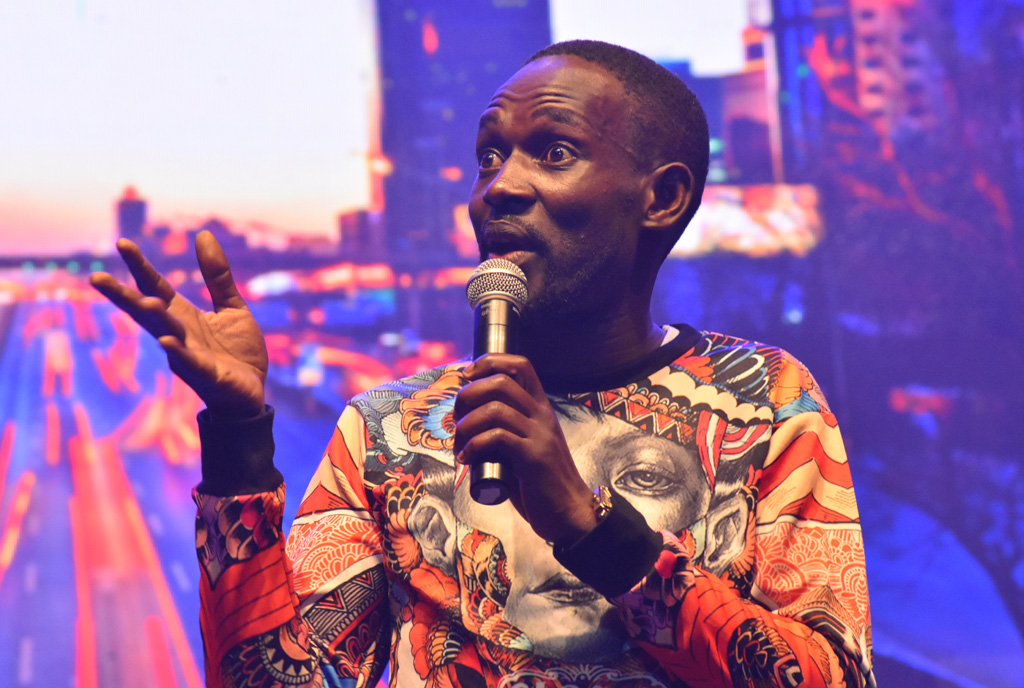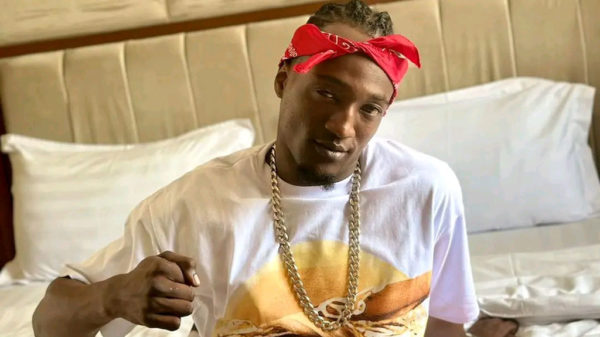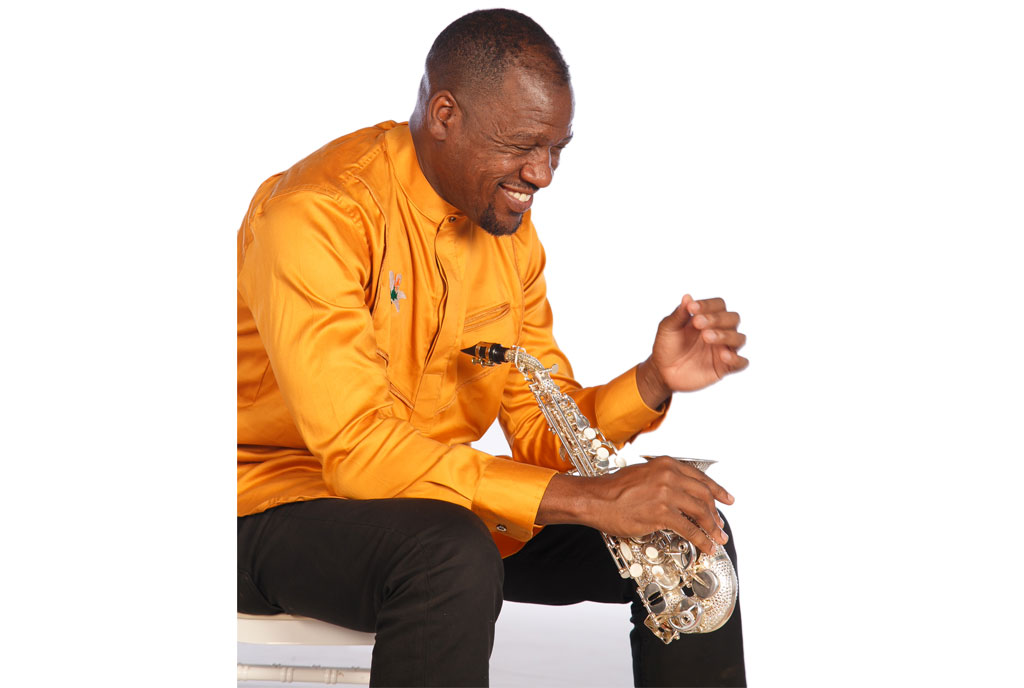What do you think of Ugandan music today?
It is growing and I am proud to be part of it. The audience is a bit more awakened. Generally, I like the fact that people are working hard.
Have you thought of collaborating with any artistes?
I have collaborated with Juliana [Kanyomozi] and I would work with anyone else but because of time, it has not been possible. Everyone is busy.
You had a strong bond with Hugh Masekela, did he influence your music in any way?
One, he was the first instrumentalist that I was exposed to in Africa and I love the fact that he was himself and never changed. I was exposed to Masekela in the 90s; I listened to his music and I was always fascinated by the fact that he remained African. Because I am self-taught, most of the instruments I listened to were American influence until I met Masekela.
As an artiste, I also had a challenge to myself. What could I do that would be me? So I listened to his music, followed him online and read his stories, and I had my answer. It was humbling to meet Masekela, ask him all the questions I had kept to myself and surprisingly, I found out that he was thinking the same about me.
He was an icon, so it must have been so hard to meet him. When did you meet?
It was interesting. In 2015, his friends invited him for a show here and he asked them to look for me. I could not imagine that he knew of my existence, so it was a shocker. They connected us on the phone and we spoke. When he came, he was supposed to work with my band, so he came to my studio, we rehearsed, he said he listens to my music, and asked me to learn his songs as he learnt mine so that we could play on one show together. I give all thanks to God and for the guys who connected us.
What did you learn from the three years you were friends?
A lot of things that I think I would have learnt in 20 years. Masekela had been in the industry for more than 60 years. He made lots of mistakes and he was open about them. One of the things I learnt about him is to be yourself. The second thing is that he was influenced by Africa. I still carry that message because it is the fans’ influence and support that makes a unique sound relevant. I learnt humility and integrity from him because sometimes being famous drives you off. He was so humble yet he carried integrity as the most important thing that lifted his career. The other things is how he related with people, how informed and articulate he was, and most of that came with experience. He was not influenced by the American ways but he still made it.
Besides Hugh Masekela, who else has influenced you?
Manu Dibango. I have grown up hearing of him as a huge legend. This guy is 84 years old and he has been in the industry for so long. In fact it is exciting for me that we are giving tribute to Hugh Masekela on the International Jazz Day because it was Masekela who introduced me to Dibango, so it is such a great honour being in the gap of two global and legendary people.
That show is on Monday, right? And it has some big names. How do you select these artistes to come to your shows?
Uganda’s music industry is the responsibility of musicians and the fans but first it is the musicians. The global names of Africa have been far. If someone has the capability of bringing them here, they should take it upon themselves. They have to tell us the secrets they have for their thriving. We need to see and they need to tell us how they have been doing it.
Were Dibango and Siphokazi the best choice?
I could not think of any other. Remember we are also celebrating International Jazz Day and one of the themes of the show is having the generals as the topic of the day.
These global icons charge a lot of money to perform outside their countries. Is it the same case with you or it is for friendship?
These are professionals. They do not need to come here. They do not need me but I need them, and what is most important is the relationship we build. It is a business transaction but because of the relationship we have, they may not charge me so highly. I know there are a lot of compromises because of what we share as artistes.
Do you see yourself stepping in any of these icons’ shoes?
No. Isaiah Katumwa will walk in Isaiah Katumwa’s shoes. You can never compare yourself to successful men. I aspire for that. They have been in the industry for more than 60 years. It is a point of learning and you try to emulate and see how far it takes you. I seek to learn, I seek to understand. I am on the journey not knowing who is leading me. No one has walked the walk I have walked. I do not know any instrumentalist in East Africa that has been successful so that I seek knowledge from them, it is these guys that I ask.
You are in an industry dominated by other music genres, how have you survived doing your own style?
Music, even jazz has different styles. Music as an art is like food; there are different kinds and not everyone is going to eat what is on the table. You choose what you want. If you do not want reggae, do not abuse it, just skip it. Just because I love jazz does not mean I do not like Rn’B, Hip hop etc. I collaborate with all these artistes. In fact most of them are my friends. I do not think there is anything to compare. My sound is different, my dream is different.
How do you measure success?
Success is measured by the following one has, especially in the music industry. Success of anybody has nothing to do with money. That is why you find people who have money but are not happy. Success is peaceful. But everyone defines success in their own way.
Are you planning on passing on your legacy?
I wish I could but I cannot. If I did not go and tell Hugh Masekela that I wanted him to answer my questions, he would not know what I wanted. I had to get out of my comfort zone. So if I want to pass on my legacy, I cannot go to someone to pass it over. The only responsibility is to my sons because I try to push them to understand where I am coming from and why I do what I do.
Speaking of your sons, we have seen one perform, are you training him to walk in your footsteps?
Just like what I said above, he too has to ask me questions. I cannot impose something on him. But he is talented. He plays the saxophone, he sings, plays the piano and is a guitarist as well.
What challenges have you faced in your career?
The biggest challenge has been being misunderstood. Whenever you do something that is not the usual, especially with jazz, there are people who think they know more than you. Anyone who pioneers something is subject to criticism. And then balancing between international and local has not been easy.
To Isaiah Katumwa, what is Jazz music?
I asked Hugh Masekela and Kirk Whalum the same question and nobody answered me. Everybody gives a vague answer to it and I am going to give you as good as I was given. Kirk said ‘Jazz is like a lizard that has been in oil. You will never catch it because it slides’. He was trying to say that jazz has been subject to movement in generations and in culture and in time. To me jazz is like a culture. It has the liberty of expression and with that, your story has to come out, your culture has to come out. However, there are certain elements of jazz that remain. The atrocity, the different notes that are unpredictable, the harmonies and codes remain.
What are your dreams in music?
I want to inspire many people and to be an icon to many – a reasonable role model. To tell the story of Uganda, but most of all never to lose my cool first to my faith, then to my family and to my saxophone.
Someone might think Shs150,000 is a lot to charge for a show.
It is not a lot of money because of the quality of the event, the quality of preparation we have put in and you can only tell when you come. No one has ever come to my show and regretted. It is a very delicately prepared event.
How many albums have you released in your career so far?
I have 11 albums, although only two are available.
Why?
We took others down because we need to upgrade them. To Ugandan standards, they were quality but when you want to pursue the international market, you have to push yourself for better and that is the decision my team and I agreed on. We need them to be quality songs.
What is a quality song to Isaiah Katumwa?
One that impresses me in the first three minutes of the first hearing. I will never like a song because of airplay or the beat it has. I studied music business and one of the things we learnt is appreciating songs in three minutes.































































